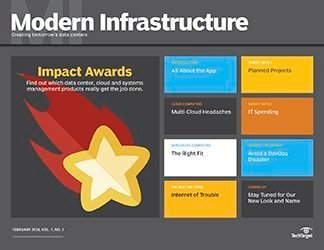PRO+ Premium Content/Modern Infrastructure
Access your Pro+ Content below.
Multi-cloud management still a work in progress for IT teams

This article is part of the Modern Infrastructure issue of February 2018, Vol. 7, No. 1
Organizations of all sizes rely on cloud services to support initiatives, stay competitive and capture greater business value. Companies often depend on multiple clouds to meet constantly evolving business goals and to avoid single-vendor lock-in and dependencies. With a multi-cloud approach, a business uses a combination of public cloud services from different providers and selects the most appropriate environment for both infrastructure and applications. The appeal of public cloud is driven by its affordability, with a broad set of capabilities available on a pay-as-you-go basis with global coverage. Also, providers have steadily improved security and met regulatory requirements that previously prevented critical workload deployments. IT environments now regularly consist of on-premises infrastructure with an infrastructure as a service (IaaS) clone, a mix of several public, private and hybrid cloud deployments and a growing reliance on software as a service. Organizations choose multi-cloud deployments for a range of reasons....
Features in this issue
-
Multi-cloud management still a work in progress for IT teams
Multi-cloud deployments are a mixed bag, providing both business value and complex management challenges. Fortunately, a number of third-party management tools can help.
-
Why deploying APIs on serverless frameworks spurs innovation
Explore why deploying APIs on serverless frameworks can help businesses grow faster and provide innovative services while decreasing developers' workloads and lowering IT costs.
Columns in this issue
-
Rely on the DevOps methodology to avoid disaster
DevOps concepts rely on both developers and operations to uphold the stability of applications in production. One side can't do it alone.
-
What's our future if we don't secure IoT devices?
When everything from the coffee maker to the manufacturing plant's robots to the electric grid is connected, shouldn't security be IT's primary concern?
